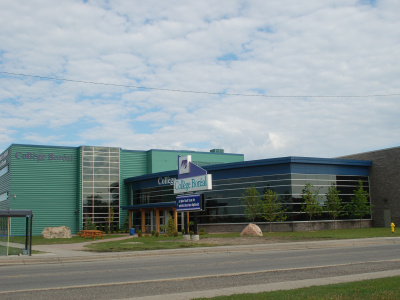Collège Boréal may be the new kid on the block but that hasn’t stopped it from achieving some impressive results.
“We are the youngest of 24 community colleges in the province,” said Danielle Talbot-Lariviere, vice- resident of workforce and business development. “But we have worked very hard. That effort has paid off.
Some key performance indicators conducted by government surveys show that in the past 11 years, Boréal has been first in graduate satisfaction.
“For the smallest and youngest college, that is something we are really proud of,” she said. Its graduation rate is also one of the highest at 74.2 per cent, an indication the college is “doing the right thing.”

This is one of a special series of articles that appeared in our July issue celebrating the 100th anniversary of the incorporation of the City of Timmins.
Collège Boréal has been in Timmins since 1995, but a new campus was built in 2009. Université de Hearst also shares some space in the facility and both institutions share services such as a library and cafeteria.
A capital campaign in the city, held prior to the completion of the building, surpassed the target that was set and along with bursaries and equipment, $1.5 million was raised.
“The community really came through for us,” Talbot-Lariviere said. “We went to the community in May for our graduation ceremonies and we got more than 30 bursaries worth more than $10,000.”
Community involvement is also tied very closely with the types of programs offered by the college. The Timmins campus offers 17. “What we are trying to do is work closely with the needs of the community and set up programs that respond to those needs,” she said.
In 2011, a two-year electrical program began, and in 2013, masonry, culinary arts and pharmacy assistant programs will be offered.
The campus’ practical nurses who graduated last year are all working in the city. “One of the advantages our graduates have is they are fully bilingual and in communities like Timmins, with a strong francophone population, they can respond to that need,” Talbot-Lariviere said.
Boréal is a French-speaking college but it does teach industry terminology in both official languages.
The campus shares an employment office with Northern College, located in the city’s downtown library, and has partnerships with two school boards to offer dual credits and to promote the Ontario Youth Apprenticeship Program (OYAP).
“For dual credits, students from high school can take a course at Boréal and it is recognized by the college and on their high school diplomas,” she said. “It is good for student engagement.”
More interaction with potential students is available through discovery camps where secondary students can come and spend a week at the campus learning about the different programs and participating in hands-on activities.
“The economy in Timmins is so strong now that a lot of students are going into the job market,” Talbot- ariviere said.
“But what can happen is that they may have to go through retraining later in life so we are trying to get them before they leave and make sure they get a diploma.
If things fall through, then they have something but when they get such a good pay cheque at a young age, it is hard to make them see otherwise.”
Collège Boréal offers 42 access centres in 28 communities where employment services, literacy and immigration services in southwestern Ontario are available.
“Two of our strategic objectives are to provide access and quality,” she said. “Having campuses and access centres in communities where there is no post-secondary education in French is important.”
The college also offers contract training to the Aboriginal population and has an agreement with the Métis Nation of Ontario. Big mine projects such as Detour Gold and the prospects of the Ring of Fire will help.
“Many of the Aboriginals are English
speaking so we don’t offer post-secondary programs but we can offer
specific training geared towards them,” Talbot-Lariviere said.
“They want the training onsite and we try to accommodate that. The
Aboriginals are definitely part of the solution for skills
shortages.” The Timmins campus has about 400 inclusive students and
it acts as a hub to the outlying areas.
“Most programs are
offered at the hubs and some are offered in our outlying areas. We
can’t build a campus in every location.”




